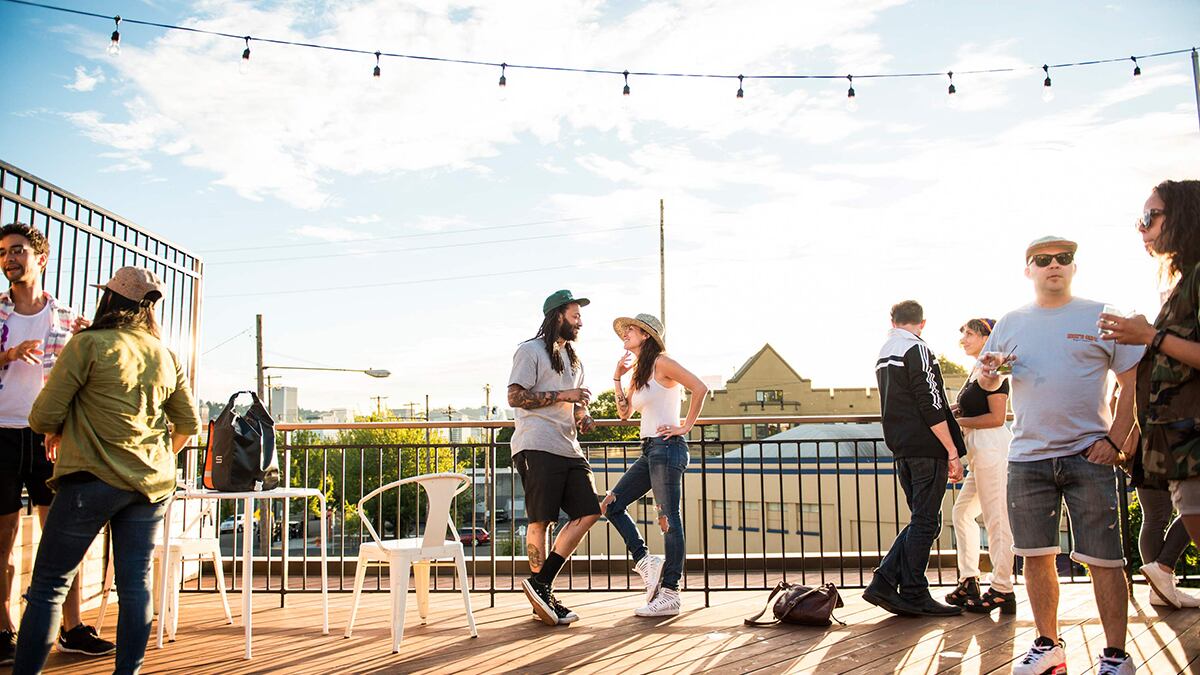All Tim Hohl could do was keep refreshing his computer screen.
As the founder of Coin Toss Brewing caught up on work at his Oregon City taproom on Sept. 10, he was simultaneously keeping track of the online Clackamas County wildfire map. Outside, smoke settled in like a thick fog and ash fell to the ground as if it were a light snow. The Riverside Fire had been creeping closer toward town, which was at Level 1: Get Ready evacuation status.
Hohl updated the website again. The area that had been highlighted in green that morning was suddenly bright yellow. All of Oregon City, including the industrial park where the brewery is located, was now upgraded to Level 2. At that point, he knew it was time to pack the essentials and go.
Two weeks later, Coin Toss is intact, the skies have cleared and customers are back in the beer garden. But between the heightened evacuation level and days of lingering haze that made outdoor drinking hazardous, Hohl still feels the sting of a week of business completely wiped out during a year when a pandemic had already eaten into profits.
"It was probably going to be one of our busiest weekends of the year, because the weather is still nice," Hohl says. "We put a lot of work into our outdoor seating area, and business has been steady until the fires hit. We had a food truck Friday, a food truck Saturday and a special event with a brunch food truck on Sunday that all got canceled."

Coin Toss is among the hundreds—if not thousands—of breweries, bars and restaurants that lost much-needed revenue in the waning days of summer following a series of devastating wildfires that have burned nearly 1 million acres to date. Although no one in Portland was forced to make a dramatic escape, the smoke-choked skies forced people to shelter inside, shutting down the outdoor oases many eateries expanded or enhanced to lure guests wary of eating inside.
"So many of the restaurants that were previously closed and then could only reopen at reduced capacity found some success with outdoor dining during the summer months," says Greg Astley, the Oregon Restaurant & Lodging Association's director of government affairs. "But, of course, with the smoke being as bad as it is, it's been a devastating blow."
The timing could not have been worse. Business owners like Eric Bowler, who operates Southeast Portland sports bar Century, along with the Tube nightclub which has been closed since March, have tried to take advantage of every day of good weather left in 2020. He estimates he lost $15,000 to $20,000 by suspending service during the week Portland experienced dangerous air quality.
"This is the time of year where you try to pay off debts of the winter and maybe get a little bit ahead," says Bowler. "It's getting to the point where the debt's gotten bigger and we're not paying any of them off. It's dire."
The restaurant association says it's difficult to gauge how much of an effect the smoke-related shutdowns will have on the industry, but it's a significant setback for businesses already ravaged by the pandemic. Of the approximately 10,000 food service establishments operating across Oregon, at least 1,000 have gone under since COVID-19 hit—and that number is only expected to grow.
"When this is all said and done, my estimate is that we'll see 30% to 40% permanent closures," Astley says. "I have seen a report that says it could be as high as 85% of independent restaurants that will permanently close their doors."
Local restaurateurs are similarly pessimistic. According to an impact survey conducted by the National Restaurant Association, 89% of Oregon restaurant operators say their total dollar sales volume in August was lower than it was one year prior. Overall, sales slid by 39% on average, while 62% of businesses reported that total operational costs spiked due to supply-chain issues.
The diminished occupancy, increased expenses and no signs that Congress will pass another stimulus package before the end of the year paint a bleak picture for bars and restaurants.
And now, winter is coming.
The week of post-Labor Day weekend closures may be something of a preview of the coming months once temperatures fall and steadier rains move in. Restaurant and bar owners don't know for sure whether patrons will want to bundle up for beers on a patio, yet many are taking measures to make those settings as cozy as possible, just in case they do.
"We've all put massive amounts of work into our outdoor spaces. What do we do when it starts raining for six months?" says Hohl, who used the spring lockdown to spruce up an underused patch of dirt and grass next to his taphouse with potted flowers, Adirondack chairs and umbrella-topped picnic tables. His landlord even allowed him to cut a hole in the wall and install a serving window.
Hohl is already thinking about winter and ways to keep utilizing the area—such as roofing in the patio and installing heaters—though he probably won't rely on the yard alone.
"We are looking at ways to actually reopen the taproom with social distancing guidelines," he says, "at least get a few tables inside."
In Portland, Ezra Caraeff closed all his properties—the Old Gold, Paydirt, Tough Luck and the Hi-Top Tavern—out of concern for his employees' health as soot and ash hung in the air. That loss in earnings means preparations for service in inclement weather have become even more important.
Related: Last Night, Ezra Ace Caraeff Reopened His Bar. He Hopes He Won't Have to Close It Again.
"As far as winter goes, I'm hoping a combination of socially distant indoor seating and outdoor tents for people who want to drink with a jacket on will work," he says. "I don't know. Honestly, no one's done this before. The one thing we keep finding as we go along here is that there's no template for this."

There are three large, heavy-duty tents—"circus grade," as Caraeff describes them—at three of the bars, and even though he knows not even those shelters can protect from the pinpricks of raindrops blown sideways during a typical December in Oregon, he's pushing forward and elevating the outdoor venues where he can. Most recently, that meant scrambling to the roof at Old Gold to run power to some new string lighting.
"We're trying," Caraeff says. "I think that's kind of our motto right now. We can't not do anything, but it's such a slow death. It feels like we're just getting to pick out our own coffin."
As if restaurant and bar owners needed another obstacle, one more challenge besides the weather awaits. The Portland Bureau of Transportation's Healthy Business permits, which it rolled out in May to allow food and beverage operators to turn street parking and alleyways into al fresco dining rooms, are set to expire Nov. 1. So far, the agency has not announced an extension but may consider one.

Eric Bowler received one of those permits to take over a portion of Southeast 10th Avenue near Sandy Boulevard, which gave him the opportunity to move all of Century outdoors. That's where he feels safest hosting game day parties and the enthusiastic shouting those events tend to inspire. If allowed to keep operating in the right of way, he's considered winterizing the space. But he isn't convinced it will be worth it.
"I just don't see how hospitable you can make a tent with heaters in terms of being able to cover your rent and utilities and payroll and insurance," Bowler says. "The math is really hard to make work."
While the industry outlook going into fall appears grim, there are reasons to remain hopeful.
"No. 1, restaurant operators are incredibly innovative and resilient," says Astley. "The other is, as Oregonians, we tend to do things in the rain or we don't do anything at all. We're more than willing to have to endure a little weather hardship in order to support our local restaurants, brewpubs and bars."
Or, even endure a little smoke.
Last Wednesday, after Portlanders had been trapped in their homes for a week to avoid breathing in the toxic air, Coin Toss' owner had no shortage of customers who were eager to hang out on the patio, even though skies still looked—and smelled—like campfire smoke.
"I think people want a little sense of normalcy and our regulars want to see each other," Hohl says. "If it helps create some sense of normalcy, then by all means, we're here."

